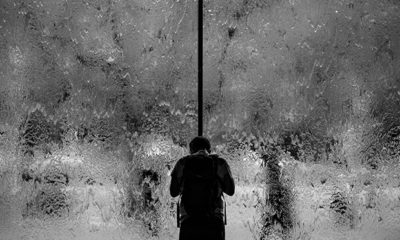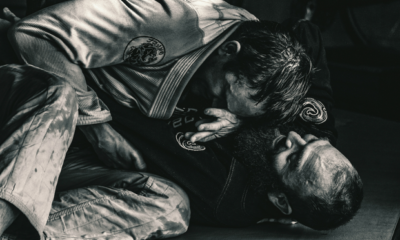Motivation
12 Lessons Explorers Can Teach You From Their Impossible Expeditions

If your weeks flat and you think you got it bad, you don’t. Imagine paddling 3318km from start to finish or skiing for 89 days to the South Pole and back – most of us would be lucky to last a day. It’s time to get off your couch and listen to one of the world’s most inspiring stories with a ton of life lessons for you to take in and apply in your own life.
The story of Cas and Jonesy, two Aussie explorers, has everything from human courage, mateship, camaraderie, to sportsmanship. The two of them spend their days making the impossible, possible and then sharing how they did it with the world.
Cas and Jonesy are most famous for completing two phenomenal outdoor expeditions:
– The first successful kayak crossing of the Tasman Sea (Australia to New Zealand) taking 62 days to complete. This makes them the Guinness World Record Holder for the longest trans-oceanic kayak trip.
– Being the first to ski from the coast of Antarctica to the South Pole and back unsupported, and unassisted (alongside Norwegian Aleksander Gamme).
The pair is also well known for the two documentaries they made about their expeditions that have now won a combined seventeen International Film Festival Awards
When I sat down with Jonesy, I was humbled by the way he lives his life’s and the lessons that he teaches without often realising that he is changing the way people think, through something as simple as sport.
Below are the twelve lessons you can learn from their expeditions.
1. Having a sense of purpose, even for a moment, is bliss
The reason Jonesy decided to do these daring adventures was because he didn’t want to have regret in his life and he wanted to feel like he had really lived. He says that when you escape to the outdoors it allows you to dream, have a vision and it makes you think about things from a different perspective – it provides an amazing crucible to find a lot out about yourself.
There is a certain clarity and purpose about being on an expedition that is slightly addictive Jonesy says. “Everything is so simple; for that moment in time all you need to do is eat, sleep, paddle, survive.”
As Jonesy headed off on the kayak trip, he told me that the purpose and focus he experienced was amazing, and his life had never felt more complete.
One night, as Jonesy was paddling through the sea, he realised that he was doing what he was supposed to be doing at that point in his life. He described the feeling as something that has stuck with him forever.
The moment when you feel a sense of purpose that you have been longing for is a true moment of pure bliss, and the feeling is hard to beat. We all should try and find a moment like this. It’s what makes us happy and fulfilled in life.
“It’s only at the very edge does the view become crystal clear” – Unknown
2. Do what you have always wanted to do
I asked Jonesy what the message is that he is trying to deliver to the world. His response was that too often in life you are told you can’t do things, or you shouldn’t do things. He believes there was an issue with education when he went to school where he was told to take the safe path in life and there were a lot of naysayers.
So Jonesy says that taking responsible risks is a good thing. Kids should be able to go out there and dream and chase their goals. He says that if he can get people to do one thing it’s to go out there and do something you have always wanted to do – in other words, follow your passion.
3. Life is about taking educated risks
So when you have completed the goal that you have set out to do which may be crazy (like kayaking the Tasman), you need to be mindful not to try and take even more risk and continually feel the need to outdo yourself. For Jonesy, this was a big part of staying alive in his adventures.
What I found bizarre was that Jonesy is actually quite a risk adverse person and so is his partner Cas. What I learnt from this is that doing dangerous things is safer if you do everything you can to have solutions to the potential risks.
Jonesy said that when doing a risky activity you need to decide what a comfortable level of risk is – this is different for everyone. He says that the more you plan, the more you can diminish the risk.
4. Learn a new skill (it’s addictive)
Jonesy managed to surprise me multiple times in our interview, but the biggest surprise was that he and Cas had never skied before preparing for the Antarctica trip, and had never kayaked offshore before preparing for the trans-tasman trip.
Most people that do what they have achieved have done these sports as their hobby, their whole life. I asked Jonesy what made him and Cas want to take these bold risks, and his response was that they found it oddly addictive to learn a skill for the first time.
Cas and Jonesy are not the kind of guys that will let a lack of skill get in the way of a dream. For them, it’s about taking progressive steps and having the belief that you can do something amazing. It’s about isolating the path you will need to take in order to have the skills that you will require by a certain point, and then reverse engineering that and working out what you need to do to get there.
Imagine we were all kids again and went out of our way to learn new skills. Too many adults don’t take the time to go off and learn new skills. They do the same things over and over again that they are good at rather than taking the time to learn a new passion – no wonder we get bored and watch TV.
5. Get motivated and be in it for the long haul
Before doing the trans-tasman kayak adventure, it took the guys two years from having the original idea to doing anything about it. Jonesy remembers writing out a big list of pros and cons to doing the expedition – the con’s far outweighed the pro’s.
Jonesy asked himself, “could I live with myself if I just sat on the sidelines and didn’t even give this a go?” That’s what really motivated him to do the first adventure. He decided to go out there and do all the research and find out if it was even possible.
Twelve months later Cas & Jonesy came up with a seventy-page risk management document. Once they had this document, they realised that their goal was possible and that they would have to commit to it straight away.
6. Learn to deal with adversity
Andrew McAuley went missing nine months before Cas & Jonesy headed out doing the exact same kayak trip that they were about to embark on. They had been planning the expedition for three and a half years and when they commenced planning they even knew that Andrew was contemplating the idea.
“The peril was there, and we knew what the consequences were, but, unfortunately, Andrew going missing really made it real”
People said to them “you can’t honestly be doing this expedition still, someone’s gone missing and died.”
Emotionally this hit them hard but at the same token they looked at the risk management work they had done and thought if they stuck to their strategy, and took emotions out of it then they could still do the expedition.
7. Prepare yourself and bring in world experts
At first, Cas & Jonesy asked all the questions that they had about the expedition and answered those. They realised pretty quickly that they were not the best at any of the tasks that needed to be done. The key for the guys was to work out who had the world’s best practices in different facets of the expedition and then get them on board to mentor them through the issues they had.
The team they put together ended up spanning seventeen different countries. Jonesy explained to me that they found it empowering to approach someone about their expedition, and then have that person give them a bunch of reasons why they were idiots.
When they were able to address these reasons and turn the naysayers into advocates, they found it to be very motivating, and it helped them keep going.
These world experts were attracted to take part in the expedition because of Cas and Jonesy’s passion. Jonesy remembers calling up experts and sponsors in the beginning and not taking ownership for what they were doing and pretending to talk about themselves in the third person.
It was only when they started saying to people, “this is what we are doing, and we are not going to let anything stop us,” that people began being attracted to their journey. “It’s the conviction that people get attracted too,” says Jonesy.
“If you’re that passionate about something there is a certain energy and chemistry that happens and draws people closer”
Looking back at the video’s they shot of themselves pitching their idea, Jonesy says, “it was obvious that we didn’t know what we were doing, but it was the passion that got us over the line.”
The seventy-page risk management document was a key component to their success in attracting world experts to their cause. To have people say they were worried about something, and then Jonesy be able to point out the solution in their document, was very helpful. The risk document showed they were prepared for the journey they were about to embark on.
In preparing for their kayak trip, the guys realised that the weakest point in their expedition was going to be themselves. Thinking outside of the box, they approached the Australian Army and got soldiers to put them through sleep and food deprivation.
During this process, they were forced to learn new skills like morse code in a tired state. Jonesy found this experience very beneficial because it allowed him to see how he would act under stress. It was also important for him to experience sensations like hallucinations so that if it happened on the expedition it wouldn’t be for the first time – again, preparation is key to achieving the impossible.
“The expeditions were a logistical nightmare to put together and like a phenomenal puzzle”
8. Control the fear
Not only did Cas and Jonesy have limited skills during their expeditions, but Cas suffers from sea sickness, and Jonesy get’s claustrophobic (these guys are the true definition of greatness). To top it off, they had a well-publicised encounter with two very large sharks on their kayak trip.
Surprisingly, while they slept and the sharks made contact with the side of their kayak cabin, the two felt quite comfortable. The time that sharks made them feel a bit more afraid was when they were paddling out in the ocean with their hands touching the top of the water, and there were sharks around.
Jonesy explained to me that fear is not a rational thing and in situations like the shark encounters it can take a hold of you. They learned on their expedition that to break through fear they needed to rationalise it.
For Cas, to overcome the sea sickness he experienced he had to take drugs that they give chemotherapy patients, acupuncture himself, and use self-hypnosis to be able to complete the kayak expedition.
Cas used a self-hypnosis track on his iPod to anchor the cabin as a safe environment for him. Jonesy said It’s about accepting the situation. The biggest thing that needs to run through your head is “it’s not good, it’s not bad, it just is.”
While discussing fear with Jonesy, he gave me a great example of a Qantas pilot Richard de Crespigny. Richard was piloting a plane a few years back when everything started to go horribly wrong. In mid air, he began getting computer readouts of all the things that were broken.
In normal situations, a pilot would go through each of the issues and attempt to fix each one. By doing a basic calculation, Richard figured out that he would run out of fuel if he went through every single warning light one by one.
Instead, ignoring all his training, he reframed the situation to “what actually is working.” This personal development technique allowed him to win his battle and land the plane safely – what a great way to deal with a fearful situation.
9. Failure happens when you least expect it
A year before Cas & Jonesy started their Kayak journey they put the kayak in the water for the very first time and it flopped over on its side. At this point, they had both put in two and a half years of their lives, spent every dollar they had, and given up their jobs.
Again, showing incredible willpower, Cas & Jonesy delayed the expedition by a year and redesigned their kayak. Getting Jonesy to describe this moment brought back the powerful emotions of frustration, but he tried not to dwell on it.
As if their kayak not floating wasn’t enough, during this expedition they managed to get stuck in strong winds and currents that forced them in circles for two extra weeks. While not ideal, the guys managed to stay strong and push through the failure so that they could complete their trip.
Jonesy says, “you can’t force a situation to work, you have to come down to the crux of it and work out what you need to do”– willpower alone and force is just not enough.
“Failure is never quite so frightening as regret”
10. Success can be lonely (but it doesn’t have to be)
As Jonesy explained his definition of success he told me that the journey is the more important thing rather than the sole outcome at the end. Jonesy says, “if you blindly go out there, and you want to win regardless of anything else, chances are you will, but what costs are you willing to pay on the way?”
On Cas & Jonesy’s kayak expedition, they pushed away a lot of people that were close to them because they had to have such a singular drive and focus.
The key for guys was to try and work out how to take those close to them along the journey and not alienate everyone around them. Success can be a very lonely thing, but you don’t have to make it that way.
11. Come down from a major high with another goal
So, like the Kieren Perkins interview, the question I wanted to know from Jonesy was how he came down from such a major high. I asked Jonesy, and he told me that after their first expedition he was on a buzz for about a week.
Then he told me that it hits you all of a sudden and for Cas & Jonesy, they realised that they had spent three and a half years of their life working on a goal with a singled minded focus. In the meantime, other parts of their life like their career and relationships hadn’t progressed at all.
Once you achieve a major goal, it’s easy to wonder what you do with your life afterwards. Jonesy says the best way to come down from a major high is to follow it up with another goal of some type. Idle time can really cripple you and make it harder to move; it’s easier to bounce from one thing to another rather than sit in stagnancy and try and get yourself going again.
12. You have the power to inspire others
Back at school Jonesy says they were just “two fat kids” and for them it was about taking those progressive steps, following their passion, which allowed them to do their expeditions. Jonesy says everyone has got this capability inside them, and it’s about building that mental strength.
Once you have found that mental strength inside yourself, you have the power to unlock it in others. Jonesy told me that he loves it when he gives a corporate speech, and he starts to see that spark in people’s eyes.
After his speech, people will come up to him to chat, and he can tell that they are going to go away and do something about their dream. This is usually a direct result of him sharing his amazing stories with them, and he knows they have taken away something that they can use.
Jonesy explained to me that it’s often just a little bit of belief that these audience members lack and he feels that he is helping to enable them to find it through his presentations.
On the other hand, it can be frustrating when people don’t believe in something, and they are just happy to drift by in life, but that’s their choice, and all you can do is try and help them on their journey.
Surround yourself with the right people and the one’s who are going to push you even harder. If people are self-motivated, then they will want to learn the skills and tasks required to get the job done.
***Final Note***
Belief has got to come from inside. By setting yourself a big goal like climbing a mountain against adverse conditions, you can empower yourself a lot more than someone telling you how to do things. Knowing how to do things will give you the tools, but you can have all the tools in the world, what you really need is to have the belief in yourself to want to go out there and do something.
Jonesy’s favourite quotes:
“Only those who risk going too far can possibly find out how far one can go”
“A ship in harbour is safe, but that’s not what ships are built for”
If you are keen to hear more about Jonesy’s adventures then support him by going to justinjonesyspeaking.com.au and follow his next adventure where he walks from the Geographical Centre of Australia down toThe Great Australian Bight.
Life
10 Research-Backed Steps to Create Real Change This New Year
This New Year could finally be the one where you break old patterns and create real, lasting change.

Every New Year, we make plans and set goals, but often repeat old patterns. (more…)
Life
How Sports Quietly Build Kids’ Emotional Intelligence And Why It Matters for Life
Sports create a natural loop of awareness and action that kids carry into real life

A missed shot in basketball. A tumble during a gymnastics routine. A tough loss in karate sparring. These moments can feel huge to a child, sparking frustration, embarrassment, or even tears. (more…)
Did You Know
7 Surprising Life Lessons Video Games Taught Me That School Never Did
Want to get better at something? Study the pros. That applies to both life and video games

If you play video games, you’ll quickly discover you’re not alone. You’ll meet people who share your interests, challenge your skills, and even teach you something new about yourself. I started gaming when I was 10. A classmate invited me to play after school, and I was hooked. (more…)
Featured
The Psychology of Motivation: How to Keep Moving Forward Every Day
Discover how daily habits, self-discipline, and a few clever strategies can spark your drive and focus.

You wake up on a typical Monday morning, glance at your clock, and realize it’s time to get moving. How do you summon that inner drive to deal with your responsibilities with a genuine smile on your face? (more…)
-

 News2 weeks ago
News2 weeks agoBrandon Willington Builds 7-Figure Business by Ignoring Almost Everything
-

 Health & Fitness3 weeks ago
Health & Fitness3 weeks agoWhat Minimalism Actually Means for Your Wellness Choices
-

 Did You Know3 weeks ago
Did You Know3 weeks agoWhy Most Online Courses Fail and How to Fix Them
-

 Business3 weeks ago
Business3 weeks agoIf Your Business Internet Keeps Letting You Down, Read This
-

 Business1 week ago
Business1 week agoEntrepreneur’s Guide to Pay Stubs: Why Freelancers and Small Business Owners Need a Smart Generator
-

 Business7 days ago
Business7 days agoThe Salary Shift Giving UK Employers An Unexpected Edge
-

 Business1 week ago
Business1 week agoThe Simple Security Stack Every Online Business Needs
-

 Scale Your Business1 week ago
Scale Your Business1 week ago5 Real Ways to Grow Your User Base Fast




























9 Comments